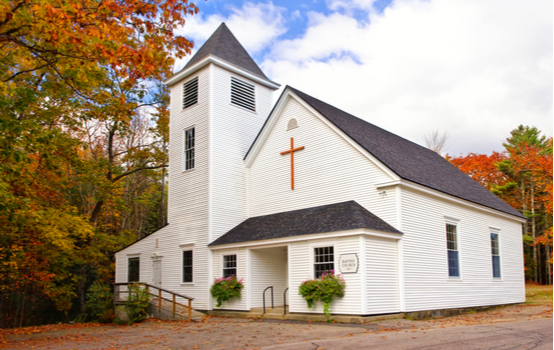Trump Reverses Obama on Religious Colleges

Last August, the Obama administration ordered schools to change their policies in order to be open to students without reference to biological sex. To accomplish this, the Obama administration redefined the meaning of “sex” to include “gender identity.” This order—which was rescinded by President Trump in February—threatened religious freedom in schools in the name of diversity. Schools would have been “forced…to adopt controversial policies related to gender identity,” regardless of the beliefs many of them were founded on.
But contrary to what some claim, protecting religious freedom in education secures individual rights of conscience and nurtures diversity. Religious freedom protections in schools create space for students develop their worldviews.
By stripping away religious freedom, the Obama administration sought to deprive schools of what makes their students’ academic experiences unique, especially at religious colleges and universities. As a result, the diversity of American education and educational institutions would have been weakened and transformed into a dialogue of feelings and uniformity rhetoric. Diversity is threatened whenever religious protections are stripped from schools, forcing their policies to be no different than those of secular institutions.
The Slippery Slope of Redefining the Natural Law
This was not the government’s first attempt to threaten religious colleges. During the Obergefell v. Hodges oral argument at the Supreme Court in June 2015, the Solicitor General admitted to Justice Samuel Alito that faith-based colleges opposing the legitimacy of same-sex marriage might struggle to keep their tax-exempt status.
Not long after the Obergefell decision, the same colleges and institutions that struggled with the redefinition of marriage were told that if they refused to cooperate with the government’s new definition of sex to include gender identity, they could lose their tax-exempt status. Some faith-based colleges have since caved on their theological convictions, implementing new definitions of sex in the name of diversity.
What “Gender Identity” Accommodation Means For Higher Education
Under the policy, what was once recognized as exclusively female or exclusively male— restrooms, showers, locker rooms, overnight accommodations for field trips or sporting events—would have been required by federal law to change to include procedures for students based on identity, not biology. This action would broaden the meaning of sex as a protected civil rights class for schools receiving Title IX funds.
In response to the letter, Federal Judge Reed O’Connor of the Northern District of Texas blocked the administration’s attempt to redefine sex by stating that—“the term ‘sex’ unambiguously refers to biological sex and that, in any event, the guidance was ‘legislative and substantive’ and thus formal rulemaking should have occurred prior to the adoption of any such policy.” In short, he concluded that the government had overreached its limits of power, a driving factor for why President Trump rescinded the policy upon taking office.
How Religious Freedom Promotes Diversity in Education
I chose to attend a small Evangelical liberal arts college precisely because of its diversity. I wanted to be taught from a religious worldview, something most colleges refuse to do. For graduate school, I sought a natural law worldview, also something most colleges no longer emphasize, so I enrolled at a Roman Catholic university. Both schools are faith-based institutions, yet completely different in how they carry out their religious mission, just as a state school will carry out its mission very differently than will a Quaker school.
American higher education is supposed to be the very model of diversity. We see it in small liberal arts colleges in larger state universities, in schools that specialize in art, culinary skills, and engineering, in those that adhere to a biblical definition of marriage and sex, and in those that do not. What makes higher education in America unique is the diversity that various schools offer for higher learning.
Policies like the Obama administration’s transgender directive eliminate that freedom to be unique. The government should not force religious colleges to choose between their faith and their accreditation.
By protecting religious freedom in education, we are protecting students from being deprived of a truly diverse education.
Dear Colleague and Gloucester Rescinded—Let the States Decide
Following Judge O’Connor’s decision, President Trump rescinded the Obama directive. “The Departments believe that, in this context, there must be due regard for the primary role of the States and local school districts in establishing educational policy,” Trump’s letter explained. In turn, the Supreme Court, which had agreed to examine a lower court ruling in favor of a transgender student, reversed course after President Trump’s new guidance, declining to hear the case and sending it back to the lower court for reconsideration.
This is a tremendous victory for religious educational institutions. Obama’s “Dear Colleague” policy was bad public policy, threatening the freedom and privacy of students. Had the November elections turned out differently, religious colleges would still be under immense threat. Democratic presidential candidate Hillary Clinton vowed to fulfill the executive action Barack Obama started, claiming that, “deep-seated cultural codes, religious beliefs and structural biases have to be changed.”
Now, private faith-based colleges are once again protected from having to choose between their religious beliefs on human sexuality and their college’s accreditation. And more students, like me, are able to experience a diverse education.
But these are incomplete victories. Gloucester will be remanded to the Fourth Circuit, meaning the case is not yet over. In a post-Obergefell era, President Trump has a daunting job ahead of him.
So far though, Trump’s action to protect religious freedom in education is worth recognizing and applauding. Religious colleges can still be promoters of real diversity.
Abigail Doty is a policy analyst for First Liberty Institute, a national non-profit legal organization protecting religious freedom for all Americans.
Comments